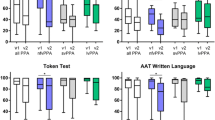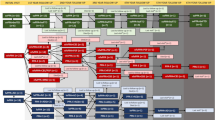Abstract
Objective
The variants of primary progressive aphasia (PPA) are predominantly diagnosed on the basis of specific profiles of language impairments. Deficits in other cognitive domains and their evolution over time are less well documented. This study examined the cognitive profiles of the PPA variants over time and determined the contribution of cognition on functional capacity.
Methods
Longitudinal performance on the Addenbrooke’s Cognitive Examination-III (ACE-III) total and cognitive subdomains were investigated in 147 PPA individuals (41 logopenic [lv-PPA], 44 non-fluent [nfv-PPA], and 62 semantic variants [sv-PPA]). The relative contribution of ACE-III subdomain scores to overall functional capacity over time was identified using mixed and hierarchical regression modelling.
Results
The annual rate of global ACE-III decline was twice that in lv-PPA than in nfv-PPA and sv-PPA, despite lv-PPA performing intermediate to the other variants at baseline assessment. Notably, attention and visuospatial subdomains declined faster in lv-PPA than in nfv-PPA and sv-PPA; and memory impairment was more severe in lv-PPA than in nfv-PPA at all time points. Functional decline was comparable across PPA variants; however, the contribution of cognition on functional capacity varied across variants and over time.
Conclusion
The cognitive profiles of the PPA variants are distinct at baseline and over time. Crucially, cognitive decline in lv-PPA was more widespread and pervasive than in nfv-PPA and sv-PPA. Our findings also demonstrate the complex interplay between cognition and functional capacity. This study underscores the importance of routinely assessing cognition and functional capacity in PPA to improve diagnostic accuracy and provide targeted support services.






Similar content being viewed by others
Data availability
The syntax and code used for this project have been made available for review on the Open Science Framework website (https://osf.io/63vhz/). The data that support the findings of this study are available from the corresponding author upon reasonable request.
References
Gorno-Tempini ML et al (2011) Classification of primary progressive aphasia and its variants. Neurology 76(11):1006–1014
Tippett DC (2020) Classification of primary progressive aphasia: challenges and complexities. F1000Res 9(64):64. https://doi.org/10.12688/f1000research.21184.1
Kamath V, Sutherland ER, Chaney GA (2020) A meta-analysis of neuropsychological functioning in the logopenic variant of primary progressive aphasia: comparison with the semantic and non-fluent variants. J Int Neuropsychol Soc 26(3):322–330
Foxe D et al (2020) Visuospatial short-term and working memory disturbance in the primary progressive aphasias: neuroanatomical and clinical implications. Cortex 132:223–237
Watson CL et al (2018) Visuospatial functioning in the primary progressive aphasias. J Int Neuropsychol Soc 24(3):259–268
Hsieh S et al (2012) Longitudinal changes in primary progressive aphasias: differences in cognitive and dementia staging measures. Dement Geriatr Cogn Disord 34(2):135–141
Tippett DC et al (2019) Visuomotor figure construction and visual figure delayed recall and recognition in primary progressive aphasia. Aphasiology 30:1–15
Leyton CE et al (2013) Cognitive decline in logopenic aphasia: more than losing words. Neurology 80(10):897–903
Libon DJ et al (2009) Neuropsychological decline in frontotemporal lobar degeneration: a longitudinal analysis. Neuropsychology 23(3):337–346
Leyton CE, Ballard KJ (2016) Primary progressive aphasia: conceptual evolution and challenges. Neurosci Neuroecon 5:9–18
Leyton CE et al (2016) Distinctive pathological mechanisms involved in primary progressive aphasias. Neurobiol Aging 38:82–92
Owens TE et al (2018) Patterns of neuropsychological dysfunction and cortical volume changes in logopenic aphasia. J Alzheimers Dis 66(3):1015–1025
Eikelboom WS et al (2018) Episodic and working memory function in primary progressive aphasia: a meta-analysis. Neurosci Biobehav Rev 92:243–254
O’Connor CM et al (2016) The relationship between behavioural changes, cognitive symptoms, and functional disability in primary progressive aphasia: a longitudinal study. Dement Geriatr Cogn Disord 42(3–4):215–226
Jang J et al (2012) Activities of daily living in progressive non-fluent aphasia, logopenic progressive aphasia and Alzheimer’s disease. Dement Geriatr Cogn Disord 33(5):354–360
So M et al (2018) Addenbrooke’s Cognitive Examination III: psychometric characteristics and relations to functional ability in dementia. J Int Neuropsychol Soc 24(8):854–863
Hsieh S et al (2013) Validation of the Addenbrooke’s Cognitive Examination III in frontotemporal dementia and Alzheimer’s disease. Dement Geriatr Cogn Disord 36(3–4):242–250
Mioshi E et al (2006) The Addenbrooke’s Cognitive Examination Revised (ACE-R): a brief cognitive test battery for dementia screening. Int J Geriatr Psychiatry 21(11):1078–1085
Klunk WE et al (2004) Imaging brain amyloid in Alzheimer’s disease with Pittsburgh compound-B. Ann Neurol 55(3):306–319
Leyton CE et al (2011) Subtypes of progressive aphasia: application of the International Consensus Criteria and validation using beta-amyloid imaging. Brain 134(Pt 10):3030–3043
Flanagan EC et al (2014) Memory and orientation in the logopenic and nonfluent subtypes of primary progressive aphasia. J Alzheimer’s Dis 40(1):33–36
Ramanan S et al (2016) Non-verbal episodic memory deficits in primary progressive aphasias are highly predictive of underlying amyloid pathology. J Alzheimers Dis 51(2):367–376
Leyton CE et al (2010) Application of Addenbrooke’s cognitive examination to diagnosis and monitoring of progressive primary aphasia. Dement Geriatr Cogn Disord 29(6):504–509
Folstein MF, Folstein SE, McHugh PR (1975) “Mini-mental state”. A practical method for grading the cognitive state of patients for the clinician. J Psychiatr Res 12(3):189–198
Wechsler D (1997) WAIS-3., WMS-3: Wechsler adult intelligence scale, Wechsler memory scale: technical manual. Psychological Corporation
Gelinas I et al (1999) Development of a functional measure for persons with Alzheimer’s disease: the disability assessment for dementia. Am J Occup Ther 53(5):471–481
Ramanan S et al (2020) Understanding the neural basis of episodic amnesia in logopenic progressive aphasia: a multimodal neuroimaging study. Cortex 125:272–287
Ramanan S et al (2020) Establishing two principal dimensions of cognitive variation in logopenic progressive aphasia. Brain Commun 2(2):fcaa125. https://doi.org/10.1093/braincomms/fcaa125
Ramanan S et al. (2020) Evidence for a pervasive autobiographical memory impairment in logopenic progressive aphasia: clinical and neural correlates. medRxiv. https://doi.org/10.1101/2020.06.14.20131383
Kertesz A et al (2003) Primary progressive aphasia: diagnosis, varieties, evolution. J Int Neuropsychol Soc 9(5):710–719
Gorno-Tempini ML et al (2004) Cognition and anatomy in three variants of primary progressive aphasia. Ann Neurol 55(3):335–346
Croot K et al (2012) Apraxia of speech and phonological errors in the diagnosis of nonfluent/agrammatic and logopenic variants of primary progressive aphasia. J Speech Lang Hear Res 55(5):S1562–S1572
Foxe D et al (2016) The neural correlates of auditory and visuospatial span in logopenic progressive aphasia and Alzheimer’s disease. Cortex 83:39–50
Jhoo JH et al (2014) A normative study of the disability assessment for dementia in community-dwelling elderly Koreans. Psychiatry Investig 11(4):446–453
Suh GH et al (2004) A longitudinal study of Alzheimer’s disease: rates of cognitive and functional decline. Int J Geriatr Psychiatry 19(9):817–824
Mioshi E, Hodges JR (2009) Rate of change of functional abilities in frontotemporal dementia. Dement Geriatr Cogn Disord 28(5):419–426
Wong S et al (2020) Apathy and its impact on carer burden and psychological wellbeing in primary progressive aphasia. J Neurol Sci 416:117007
Acknowledgements
We thank all the participants and their carers for their time and contribution to this study. We acknowledge the statistical assistance of Jim Matthews from the Sydney Informatics Hub, a Core Research Facility of the University of Sydney.
Funding
This work was supported in part by funding to ForeFront, a collaborative research group dedicated to the study of frontotemporal dementia and motor neuron disease, from the National Health and Medical Research Council (NHMRC) (GNT1037746) and the Australian Research Council (ARC) Centre of Excellence in Cognition and its Disorders Memory Program (CE11000102). MI is supported by an Australian Research Council Future Fellowship (FT160100096), JRB was supported by an NHMRC Early Career Fellowship (GNT1072451), and OP is supported by an NHMRC Senior Research Fellowship (GNT1103258). The authors certify that no actual or potential conflict of interest in relation to this study exists.
Author information
Authors and Affiliations
Contributions
DF, MI, and OP contributed to the design and conceptualisation of the study, analysis and interpretation of data, and drafting and revising the manuscript. AH contributed to analysing and interpreting the data and improving the study design. JC, JRH, RMA, and JRB contributed to the acquisition and interpretation of data and revising the manuscript.
Corresponding author
Ethics declarations
Conflicts of interest
The authors declare that they have no conflict of interest.
Ethical approval
Human Research Ethics Committee of South Eastern Sydney Local District and the University of New South Wales.
Consent to participate
All participants or their person responsible provided written informed consent in accordance with the Declaration of Helsinki.
Supplementary Information
Below is the link to the electronic supplementary material.
Rights and permissions
About this article
Cite this article
Foxe, D., Irish, M., Hu, A. et al. Longitudinal cognitive and functional changes in primary progressive aphasia. J Neurol 268, 1951–1961 (2021). https://doi.org/10.1007/s00415-020-10382-9
Received:
Revised:
Accepted:
Published:
Issue Date:
DOI: https://doi.org/10.1007/s00415-020-10382-9




